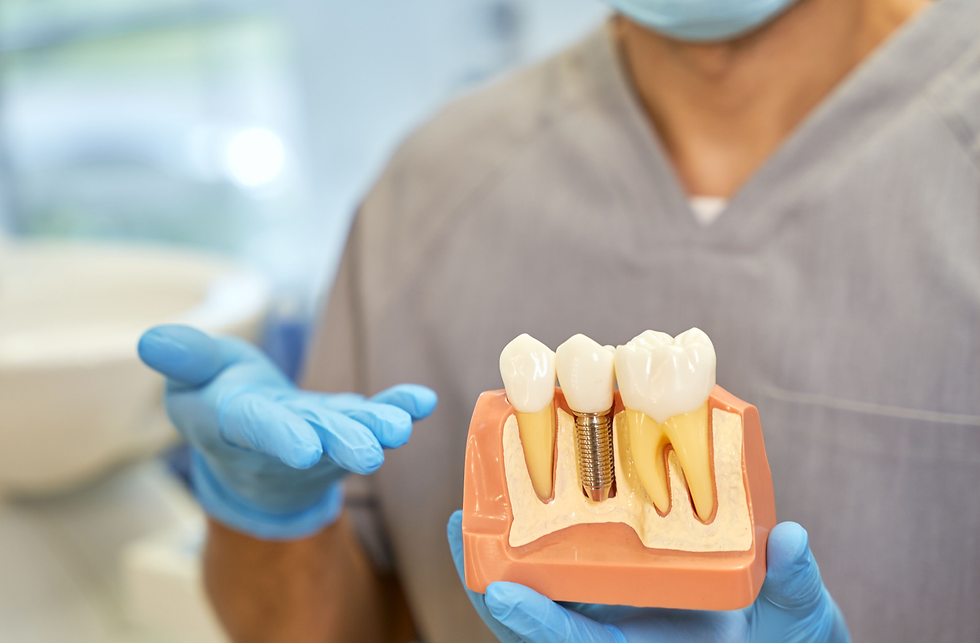Dental Braces Pricing Trends in Dubai: What’s New
- Areej george
- Sep 6, 2024
- 4 min read
Dental braces have long been a popular choice for correcting misaligned teeth and improving overall dental health. As orthodontic technology advances, the cost and availability of braces have evolved, reflecting changes in materials, techniques, and treatment approaches. In this article, we'll explore the latest trends in dental braces, focusing on what’s new in the industry.
Innovations in Orthodontic Technology
The orthodontic treatment cost in dubai has seen significant technological advancements in recent years. These innovations have impacted both the effectiveness of treatment and the pricing trends associated with dental braces.
Clear Aligners
Clear aligners, such as Invisalign, have revolutionized orthodontic treatment by offering a discreet alternative to traditional metal braces. Made from a series of custom-made, removable trays, clear aligners gradually shift teeth into the desired position. This technology has become increasingly popular due to its aesthetic appeal and convenience, leading to a rise in its availability and a broader range of pricing options.
Digital Impressions
Traditional dental impressions, which involve molding a patient’s teeth with a putty-like substance, are being replaced by digital impressions. This technique uses 3D scanning technology to create a precise digital model of the teeth. Digital impressions are more comfortable for patients and provide a higher level of accuracy, which can result in more effective and efficient treatment plans.

Self-Ligating Braces
Self-ligating braces are another innovation that has gained traction. Unlike traditional braces that require elastic or metal ties to hold the archwire in place, self-ligating braces use a built-in mechanism to secure the wire. This reduces friction, which can lead to shorter treatment times and fewer adjustments. The introduction of self-ligating braces has impacted pricing trends by offering a premium option for those seeking faster results.
Emerging Materials and Techniques
The materials and techniques used in orthodontics continue to evolve, influencing the cost and effectiveness of braces.
Ceramic Braces
Ceramic braces are a less noticeable alternative to metal braces. They use clear or tooth-colored brackets that blend with the teeth, making them a popular choice among adults and teens who prefer a more discreet option. While ceramic braces can be more expensive than traditional metal braces, they offer a significant aesthetic advantage.
Lingual Braces
Lingual braces are placed on the back of the teeth, making them invisible from the front. This option is ideal for individuals who want a completely discreet treatment. Lingual braces can be more complex to install and adjust, which can impact their overall cost. However, their invisibility makes them an attractive choice for those seeking a non-visible solution.
Accelerated Orthodontics
Accelerated orthodontics is a technique designed to speed up the treatment process. This approach uses devices or procedures that stimulate the teeth and surrounding bone, potentially reducing the overall time needed to achieve desired results. While this option can be more expensive due to the additional technology and techniques involved, it appeals to patients looking for quicker outcomes.
Factors Influencing Pricing Trends
Several factors contribute to the variability in braces pricing. Understanding these factors can help patients make informed decisions about their orthodontic treatment.
Complexity of Treatment
The complexity of an individual’s orthodontic needs plays a significant role in determining the cost of braces. Patients with more severe misalignments or specific dental issues may require more extensive treatment plans, which can increase the overall cost. In contrast, cases that are straightforward and require less time and effort may be less expensive.
Duration of Treatment
The length of time required to complete orthodontic treatment can also impact pricing. Longer treatment times often mean more visits to the orthodontist and additional adjustments, which can contribute to higher costs. Conversely, shorter treatment times may result in lower overall expenses.
Type of Braces
The type of braces chosen can influence the cost. Traditional metal braces are generally more affordable compared to clear aligners or lingual braces. Patients who opt for advanced materials or technologies, such as self-ligating braces or accelerated orthodontics, may experience higher costs due to the additional features and benefits provided.
Insurance and Payment Options
Many insurance plans now offer coverage for orthodontic treatment, which can help offset some of the costs associated with braces. Additionally, orthodontic practices often provide flexible payment plans and financing options to make treatment more accessible. Patients should check with their insurance providers and orthodontists to explore available options and determine what coverage and payment plans best fit their needs.
Choosing the Right Option
When considering dental braces, it’s important to evaluate not only the cost but also the effectiveness and suitability of the treatment for your specific needs. Consulting with an orthodontist can provide valuable insights into which type of braces will offer the best results for your dental goals.
Assessing Your Needs
Before deciding on a type of braces, it’s essential to assess your orthodontic needs and preferences. Factors such as the severity of your dental issues, your aesthetic concerns, and your treatment goals should all be considered. An orthodontist can help you understand the advantages and limitations of each option and guide you in making an informed choice.
Understanding Long-Term Benefits
While the initial cost of braces is an important consideration, it’s also crucial to evaluate the long-term benefits. Investing in high-quality braces and advanced technology can lead to more effective treatment, shorter treatment times, and improved outcomes. Considering the overall value and potential benefits of different braces options can help you make a decision that aligns with your dental health goals and budget.
Conclusion
The landscape of dental braces has evolved significantly, with new technologies, materials, and techniques shaping the way orthodontic treatment is delivered. As these advancements continue to develop, patients have access to a wider range of options and pricing trends. By staying informed about the latest innovations and understanding the factors that influence cost, individuals can make well-informed decisions about their orthodontic care and achieve the smile they’ve always wanted.












Comments